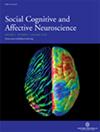在社会竞争与合作过程中,对社会等级的敏感度提高
IF 3.1
2区 医学
Q2 NEUROSCIENCES
引用次数: 0
摘要
社会等级是社会组织的一个典型特征。快速识别社会等级信息的能力对于适应社会环境至关重要。在这里,我们采用快速周期性视觉刺激(FPVS)和脑电图(EEG)分别评估了在社会竞争和合作过程中神经系统对社会等级的反应。受试者首先从竞争游戏与合作游戏中学习了等级面孔。然后,我们在一组面孔中以特定频率依次呈现所学的等级面孔。结果显示,与竞争情境相比,在合作情境中,被试对劣势玩家的社会等级评价较低,这表明社会情境会影响对他人等级的判断。此外,与中等等级的面孔相比,高等级和低等级面孔的神经反应更高,这表明面孔能快速分辨社会等级。有趣的是,在竞争情境中,等级特异性神经反应比在合作情境中更明显,这表明在社会竞争与社会合作中,对社会等级的敏感性增加了。这项研究提供了行为和神经证据,证明了在竞争与合作的社会情境中,社会等级信息的快速、自动处理以及对此类信息的敏感性的提高。本文章由计算机程序翻译,如有差异,请以英文原文为准。
Increased sensitivity to social hierarchy during social competition versus cooperation
Social hierarchy is a typical feature of social organization. The ability to quickly recognize social hierarchy information is crucial for adapting to social contexts. Here, we adopted fast periodic visual stimulation (FPVS) with electroencephalography (EEG) to assess the neural responses to social hierarchy during social competition and cooperation, respectively. Participants first learned hierarchical faces from a competitive game versus a cooperative game. We then sequentially presented the learned hierarchical faces with a specific frequency in a set of faces. Results showed that participants rated the inferior player as lower in the social hierarchy in the cooperative context compared to the competitive context, indicating that social context affects the judgment of others’ rank. Moreover, higher neural responses to high and low-hierarchy faces versus medium-hierarchy faces were observed, suggesting rapid discrimination of social hierarchy from faces. Interestingly, rank-specific neural responses were more pronounced in the competitive context than in the cooperative context, indicating increased sensitivity to social hierarchy during social competition versus social cooperation. This study provides behavioral and neural evidence for rapid, automatic processing of social hierarchy information and for an increased sensitivity to such information in competitive versus cooperative social contexts.
求助全文
通过发布文献求助,成功后即可免费获取论文全文。
去求助
来源期刊
CiteScore
6.80
自引率
4.80%
发文量
62
审稿时长
4-8 weeks
期刊介绍:
SCAN will consider research that uses neuroimaging (fMRI, MRI, PET, EEG, MEG), neuropsychological patient studies, animal lesion studies, single-cell recording, pharmacological perturbation, and transcranial magnetic stimulation. SCAN will also consider submissions that examine the mediational role of neural processes in linking social phenomena to physiological, neuroendocrine, immunological, developmental, and genetic processes. Additionally, SCAN will publish papers that address issues of mental and physical health as they relate to social and affective processes (e.g., autism, anxiety disorders, depression, stress, effects of child rearing) as long as cognitive neuroscience methods are used.

 求助内容:
求助内容: 应助结果提醒方式:
应助结果提醒方式:


